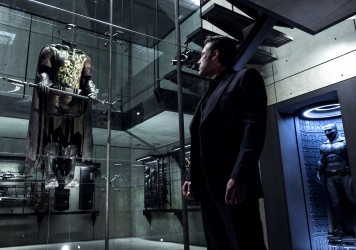
There are a select few perfect comedic premises. The 2000-Year-Old Man is one; Going for an English is another. There’s Dame Edna’s love of the spotlight combined with a clear contempt for the general public, and Laurel and Hardy attempting to push a piano up a flight of stairs. In each case, the original idea is so perfectly formed that every joke that follows in its wake is bound to land. One night, while taking part in a Second City improvisation class in the 1980s, Greg Glienna had an idea worthy of a place in the pantheon.
Glienna, at the time a stand-up comedian and aspiring filmmaker, improvised a scene with his friend in which he played a man meeting his girlfriend’s father for the first time. Speaking to me from his home in Los Angeles decades after the fact, the comic remembers no details about the content of the sketch they performed that day in Chicago but there was something about the idea he couldn’t shake. Years later it would form the basis for a short film, The Vase, in which Glienna’s character went over to meet his partner’s parents and broke their prize vase. The premise, however, had not come close to reaching its final form.
The filmmaker had the ideal preparation for playing an everyman with what he describes as an “ordinary, Midwestern upbringing” that primarily involved borrowing silent movies from the public library. He firmly believed The Vase could be expanded into an oxymoronic silent comedy with words since he felt, “In most cases, you could put regular dialogue over those films, not jokes, and it would still be funny because the situations were funny.” His friend, legendary American stand-up Emo Philips, disagreed and said he would help fund the thing if he liked the script enough. The screenplay was written in a month and Phillips was clearly impressed since the final film includes a theme tune written by him as well as a cameo and executive producer credit.
The finished product was inspired in equal parts by Glienna’s silent heroes, Peter Sellers in The Party and the hidden camera reality series Candid Camera since the filmmaker noticed real people rarely reacted in extreme ways however much madness surrounded them. Indeed, Glienna’s performance in the original 1992 Meet the Parents, shot on 16mm, owes much to the Great Stone Face himself, Buster Keaton, as his character suffers humiliation after humiliation with little more than a blink of the eyes and a look that suggests he would expect nothing more from the universe. And as was so often the case in those silent comedies of yore, Glienna plays a character who shares his first name.
It would be tempting to suggest the original Meet the Parents is a lost classic that is far superior to the 2000 remake, but the films are better viewed as companion pieces than rivals. In Glienna’s words, “The remake is like mine but different. I was happy with it.” The 1992 version is darker and stranger, like an episode of Curb Your Enthusiasm directed by Lars von Trier. The film opens with a man stopping off at a gas station en route to meet his fiancée’s parents and mentioning his plans to the owner, who warns him off the trip by recounting the tale of Greg.
This story within a story structure allows the film to push the envelope, most notably with the deaths of a dog and, at the denouement, most of the principal characters. The tale being told may be apocryphal but, more crucially, the framing device allows Glienna to cut away from the darkest material and back to the incredulity of the man being told the story. Filming took just two weeks and many scenes were shot in one take. By way of comparison, the most violent act inflicted on an animal in the 2000 version involves a cat having its tail spray-painted. Comparing the original with the remake is the equivalent of pitting The Velvet Underground against The Strokes; one wouldn’t exist without the other but there is plenty of room for both.
Glienna’s film screened at a few independent cinemas in America and a handful of festivals such as London and Edinburgh. The best reviews came courtesy of the British press – it’s not hard to see why since the bleak tone feels more of a piece with sitcoms like Steptoe and Son and Fawlty Towers than American network television of the era. The latter was a formative influence on Glienna, along with Englishmen Charlie Chaplin and Stan Laurel, so those reviews from across the pond felt especially satisfying.

A deal was made with National Lampoon for a VHS release since the president at the time was hoping to change their image after a string of gross-out comedies. They even went as far as concocting a tagline of Biblical proportions, fitting given the protagonist calls to mind Old Testament figures like Job and Noah: “Into each life some rain must fall… Greg better build an ark.” Yet, in a turn of events that would become frustratingly familiar, the deal fell through.
In a case of life imitating art, Glienna found himself suffering further indignities. After the disappointment with National Lampoon, up-and-coming filmmaker Steven Soderbergh saw the film and was keen to direct a remake, telling Glienna in a phone call, “This is such a universal premise that everyone in the world can relate to.” He took the idea to Universal and the original film’s writers (Glienna and collaborator Mary Ruth Clarke) met with Soderbergh and were tasked with rewriting the script for a more mainstream audience. As is so often the way in Hollywood, the pair wrote a couple of drafts early in the process (including material which would end up in the remake) before being let go. The starry 2000 version, directed by Jay Roach and starring Ben Stiller and Robert De Niro, affords the pair no more than a story credit.
The remake, ultimately written by Jim Herzfeld and John Hamburg, underlines its major studio credentials from the off with a Randy Newman song in place of the Emo Philips one. The most inspired modification to the source material came once casting had taken place. Having secured Stiller and De Niro as the leads, the character of Greg (the name unchanged) became Jewish. This adds a culture clash element to proceedings, not least in Stiller’s juxtaposition with Owen Wilson, his fiancée’s blonde, WASPy and seemingly flawless ex. In a sense, this religious element is one aspect of a larger tonal shift.
In 1992’s Meet the Parents, the primary antagonist is fate. Glienna and Clarke delighted in starting work by coming up with a series of unfortunate events (every worst-case scenario they could throw at Greg) and listing them in ascending order of horror. In one early scene, Greg tries to find something to watch on TV with his prospective in-laws but every channel he flicks onto is airing some kind of sex scene. It’s relatable and funny but it also perfectly encapsulates the fine line between comedy and horror. The weekend is somehow fated to go wrong and, like a character from a Greek tragedy, Greg is entirely helpless to prevent it. The Coen brothers might have been accused of cruelty to their characters over the years but even they have never been this unkind.
Roach’s box office smash still delights in placing banana skins in Greg’s path, but the chief antagonist is De Niro’s Jack, a war veteran and retired CIA agent. The original is a true situation comedy in that the comedy is derived almost entirely from the situation. In contrast, the remake contains lines that have echoed through the decades, most notably, “I have nipples, Greg. Could you milk me?” Stiller’s Greg is eager to impress and tries too hard while Glienna’s film is less interested in the character’s inner life. He is in a lineage with someone like Harold Lloyd in Safety Last as opposed to a traditional rom-com type.
Steven Spielberg and Jim Carrey were attached at one stage during the gestation period of the Meet the Parents remake, so it is clear the idea was a prized commodity. Ultimately the remake was a hit with critics and audiences, becoming one of the highest-grossing films of 2000, spawning two sequels (Meet the Fockers and Little Fockers) as well as inspiring a sitcom and even a reality TV show. Appropriately enough, they say success has many parents but, in this instance, the biological father seems to have been almost entirely written out of history.
This is despite similarities including but not limited to: a beloved family pet in danger; damage inflicted on a beloved grandmother’s urn; drugs wrongly assumed to be Greg’s; and business involving the potential theft of a $50 bill. Glienna had the original idea and co-wrote the first two drafts of the remake’s screenplay, and ought to have received more than a story credit, but he was let down by a lawyer. As he explains: “We got screwed by the Writer’s Guild because if you write the first draft it’s very hard to not get a script by credit. They said it was based on a previous source and put us in a category that’s usually for adaptations of books.”
Decades after both films came out, Universal still will not allow Glienna to release the original in any form. This feels particularly frustrating since the films complement each other rather than compete. The 1992 Meet the Parents has been buried by a major studio in a way that feels unprecedented and the filmmaker is baffled, stating: “I don’t know why but they just will not let me show it. I just wish I had a lawyer who knew what he was doing at the time and would have made that clear to me. My lawyer back then didn’t separate the film and the script in the contract, so the wording of it means when they bought the script they bought the film.”
Even as recently as a few months ago, the filmmaker tried again to convince Universal, but the email reply was unchanged: “We do not wish to grant additional powers to Mr. Glienna at this time.” Before that, he put the film on YouTube in its entirety but Universal asked that it be taken down. These days it is on the platform once more but hidden in such a way that one has to know where to look.
Despite the experience Glienna had with Meet the Parents, it hasn’t discouraged him too much as a filmmaker. He made Meet the Parents during a period when he was working nights as a stand-up and his latest effort, last year’s The Road Dog, returned him to that milieu, starring Doug Stanhope as an alcoholic comedian. At points Meet the Parents plays like a parody of a horror movie, but the man behind it is now hard at work on a genuine horror screenplay since he realised the comedy he likes most has plenty in common with that genre. Both comedy and horror attempt to cause a visceral reaction in a viewer and Glienna was causing audiences to cringe in discomfort years before Curb Your Enthusiasm and The Office hit our screens.
In a just world, the original Meet the Parents would be an easily accessible cult favourite that was shown at rep cinemas every couple of years and elicited raucous responses. But this is not a just world, as the film itself makes abundantly clear and bad things tend to happen with no real explanation. One must be stoic and – like the character Greg – try not to become overwhelmed by despair. After all, there are also reasons to be cheerful, such as (in the case of the real Greg) coming up with a perennially relatable comic conceit in your teens that will remain relevant for as long as there are parents to meet.
Published 9 May 2024

Thirty years ago, Gremlins 2: The New Batch and Dick Tracy arrived in one fell swoop of auteurist mania.

By Sam Moore
In 1976’s Sebastiane and 1986’s Caravaggio, the director refuses to relegate homosexuality to the subtext.

Universe building is now every studio’s top priority, but are Marvel and DC being shortsighted in their forward thinking?